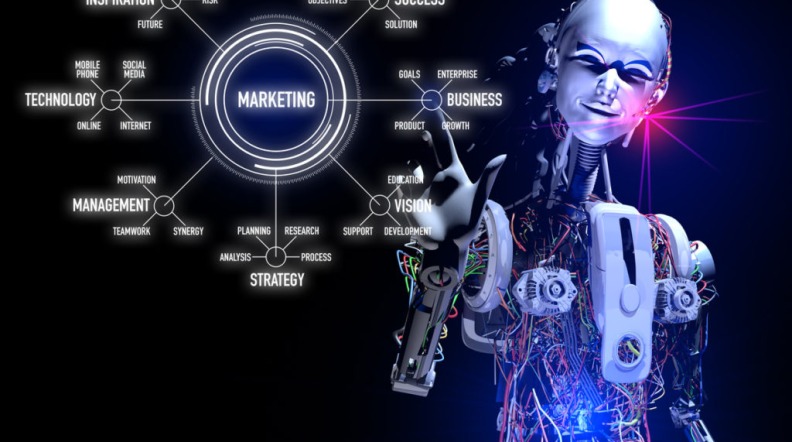Navigating the Future of AI in Marketing: Insights and Strategies






The integration of Artificial Intelligence (AI) into marketing is transforming how brands communicate with their audiences. Through AI, companies are now able to deliver marketing messages and create personalized experiences that were once impossible. This shift is not only enhancing the way brands interact with customers but also setting new standards for customer expectations.
As we look to the future, the role of AI in marketing will only grow in importance. The key for businesses will be to harness the power of AI to not just reach their audience, but to connect with them in meaningful ways. This means leveraging AI to understand and anticipate customer needs, crafting messages that resonate on a personal level, and delivering them at just the right moment.
The Evolution of AI in Digital Marketing
AI has revolutionized marketing campaigns, making them more efficient and effective. By analyzing vast amounts of data, AI enables marketers to better understand their audience and tailor campaigns to meet specific needs and preferences.
Transforming Customer Interactions with AI
AI is reshaping how customers interact with brands. It allows for real-time responses and personalized engagement, enhancing the overall customer experience.
Conversational Marketing and AI Chatbots
AI chatbots are at the forefront of conversational marketing, using AI to send marketing messages and create personalized experiences. They can handle inquiries, offer support, and guide users through the buying process, making interactions smoother and more personal.
Leveraging Predictive Analytics for Strategic Insights
Predictive analytics is a game-changer for marketing strategies. It sharpens marketing efforts and campaigns by forecasting trends and customer behavior, allowing businesses to stay ahead.
Enhancing Decision-Making with Data-Driven Predictions
Data-driven predictions offer a solid foundation for decision-making, blending AI and human interaction to produce content that resonates with audiences. This approach not only improves the effectiveness of marketing strategies but also ensures that businesses can adapt to changing consumer needs swiftly.
The Impact of Generative AI on Content Creation
Generative AI is transforming ai in digital marketing, enabling the creation of content that resonates with audiences on a new level. This technology allows for more creative and personalized content strategies.
Unlocking Creativity and Personalization in Marketing
The use of AI in marketing unlocks new potentials for creativity and personalization, allowing brands to connect with their audience in more meaningful ways.
Generating Custom Content at Scale
An AI platform can generate personalized content at scale, meeting the demands of modern marketing strategies. This capability allows for a more targeted approach to customer engagement and brand messaging.
Streamlining Operations with AI-Enhanced Tools
AI-enhanced tools are streamlining marketing operations, making processes more efficient and reducing the time spent on repetitive tasks.
Reducing Redundancy and Improving Efficiency
By applying AI to marketing strategies and customer segmentation, businesses can markedly reduce redundancy and boost efficiency. This streamlined approach enables a more focused and effective marketing effort.
The Role of AI in Shaping Marketing Strategies
AI is playing a pivotal role in shaping cutting-edge marketing strategies, enabling brands to engage with their customers on a deeper level.
Hyper-Personalization: The Key to Customer Engagement
AI-driven hyper-personalization addresses customer pain points with precision, enhancing engagement and loyalty.
Tailoring Experiences with AI Algorithms
AI algorithms are key to the future of marketing, offering a competitive advantage by tailoring experiences to individual customer preferences and behaviors.
Predictive Analytics in Formulating Marketing Strategies
Predictive analytics is essential in crafting forward-thinking marketing strategies, allowing companies to anticipate market trends and customer needs accurately.
Anticipating Future Trends and Consumer Behavior
AI has revolutionized the way businesses predict future trends and understand consumer behavior. Through leveraging AI algorithms, companies can now more accurately forecast market changes and adapt their marketing strategies accordingly. This precision allows for more targeted marketing efforts, ensuring that the right message reaches the right audience at the right time.
Overcoming Challenges with AI in Marketing
While AI brings remarkable opportunities, it also presents challenges. Marketers must navigate these carefully to fully harness AI’s potential.
Addressing Ethical Concerns and Privacy Issues
The integration of AI in marketing raises important ethical and privacy concerns. It’s crucial for businesses to address these issues transparently to maintain consumer trust.
Balancing Innovation with Responsibility
In the realm of AI, the balance between innovation and responsibility is key. AI and human interaction must be managed carefully to safeguard privacy while fostering innovation. Companies are tasked with developing AI solutions that respect ethical boundaries and enhance customer experiences without compromising personal data.
Navigating Technical Challenges and Integration Hurdles
The technical side of implementing AI in marketing involves complex challenges, including the integration of AI models and algorithms into existing systems.
Ensuring Smooth Adoption and Operational Efficiency
For a smooth adoption of AI, businesses must focus on customer segmentation. This involves using AI to analyze customer data and create detailed profiles, which, in turn, improves operational efficiency and marketing effectiveness by delivering more personalized experiences.
Preparing for the Future with AI-Driven Marketing Insights
Staying ahead requires using AI to enhance marketing strategies with deep insights and foresight.
Investing in the Right AI Marketing Tools
Choosing the right AI platform is critical. Businesses must implement AI wisely to generate effective marketing copy and build a stronger martech stack.
Evaluating Solutions for Best Fit and ROI
When selecting AI tools, companies must consider not only the technology’s current capabilities but also its potential to drive future growth. Evaluating these solutions for their fit and potential return on investment is crucial for maximizing the benefits of AI in marketing.
Future-Proofing Your Marketing Strategy
Implementing AI and integrating it with marketing copy and martech stack are fundamental steps to future-proof marketing strategies.
Staying Ahead of the Curve with AI Innovations
Innovations in AI are transforming how businesses engage with their customers. By leveraging the latest AI technologies, companies can enhance customer engagement, creating more meaningful and personalized interactions that drive loyalty and value.
A Glimpse into Success: AI in Marketing Case Studies
Exploring successful AI applications in marketing offers valuable insights into its potential impact.
Netflix: Mastering Content Personalization
Netflix has set the standard for personalized content, using AI to analyze viewing habits and engage customers effectively. This strategy has significantly improved customer loyalty and conversion rates, demonstrating the power of AI in crafting personalized experiences.
Amazon: Pioneering in Predictive Analytics
Amazon leverages predictive analytics to analyze vast amounts of data, extract meaningful insights, and make data-driven decisions. This approach enhances reputation management, optimizes traditional methods, and boosts click-through rates, showcasing the effectiveness of AI in anticipating customer needs.
Coca-Cola: Innovating with Customer-Centric Strategies
Coca-Cola embraces user-generated content to foster brand loyalty. By putting the customer at the center of its marketing strategy, Coca-Cola uses AI to analyze and understand consumer preferences, leading to more engaging and effective marketing campaigns.
Charting the Path Forward: The Future of AI in Marketing
The future of AI in marketing unfolds with leveraging AI to revolutionize content marketing and enhance marketing operations. Marketing leaders are now equipped with tools allowing marketers to interact with customers through highly targeted AI-generated content, automate repetitive tasks, and analyze customer data to provide actionable insights. AI-driven marketing strategies are reshaping the customer journey by understanding customer preferences on a deeper level. With AI technologies, the field of digital marketing is set to offer unprecedented personalization, efficiency, and strategic advantage, enabling a more connected and insightful interaction between brands and their audiences.
Embracing Generative AI for Competitive Advantage
By embracing generative AI, companies gain a competitive advantage through the power of artificial intelligence, achieving unprecedented levels of creativity and precision. Generative AI in marketing, enhanced by machine learning algorithms and computer vision, allows for the crafting of targeted ads and content that resonate deeply with audiences. This evolution of the marketing function leverages the full potential of AI to meet consumer demands with greater accuracy and relevance.
The Benefits of AI: Beyond Efficiency to Strategic Influence
AI extends its benefits beyond mere efficiency, propelling marketing strategies into new realms of strategic influence. By streamlining decision-making processes and offering rich insights into consumer behavior, AI fosters a more nuanced understanding of market dynamics. This allows businesses to not just react to the market, but to anticipate changes and craft proactive strategies that align closely with consumer needs and preferences. Ultimately, AI’s contribution to marketing transcends operational efficiency, ushering in an era of informed, agile, and impactful marketing practices.